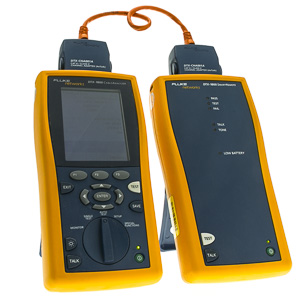Types of Tests for Cat5e and Cat6 Network Cable
Network testing plays a huge part in the world of cables, but the details surrounding network cable tests are not well known. For starters, there are different types of testers for different types of technologies, and different tests that can troubleshoot different issues. For this article we will focus on RJ45 Ethernet testers, what they are and what purpose they serve.
To start with, we will go over some typical terminology that is used in regards to network testing. We will also explore different types of network tests, and how they are executed. Many of these measurements are calculated by using mathematical formulas, of which we will show a few. If you would like to get into more technical detail with these equations, please see the ANSI/TIA-568-C.2 specification at tiaonline.org.
-
Pinout/Continuity: Testing Ethernet cables for continuity or resistance continuity
refers to the continuous path for current flow in a closed circuit. A continuity
tester will also allow you to test if electrical currents can flow between two points.
-
Resistance: This is the measurement of a conductor's opposition to an electron current, which is measured in
ohms. When there is resistance present, the current capacity will decrease as the length of a wire increases. This
means that the longer the cable, the less current capacity it has. Most professional testers have the ability to
measure ohms and can read resistance.
-
Insertion Loss: This is otherwise known as power loss in a return signal when a device is inserted down an optical
fiber line. When a transmitted signal is reflected by link components, this causes insertion loss.
-
NEXT: This acronym stands for "near-end crosstalk", which is a failure or
interference between two wires inside a cable. This can occur when the wires in a
twisted pair cable get crossed. Disturbance is the measurement of interference caused
by one twisted pair when wired pairs get crossed. Testing network cable for NEXT can
be tricky when some pairs inside the cable pass, and others fail, causing you to have
to test each wire individually.
-
PS NEXT: "Power-sum near-end crosstalk is a measurement and extension of NEXT as it applies at the ends of
four-wire twisted pair cable.
-
ACR-F: "Attenuation to crosstalk ratio - far end" Ensures a twisted pair cable receives a signal at the
receiving end of the cable, to make sure there is no other interference from other cable pairs. ACR-F is measured by
network testers in decibels. A network tester can calculate the signal power transmitted into one end of a link of a
twisted pair.
-
PS ACR-F: "Power Sum Attenuation-to-Crosstalk-Far End": The difference between PSNEXT and attenuation on
the farthest end of the cable. PS ACR-F calculates the power sum of an individual pair ACR-F.
-
ACR-N: "Attenuation to Crosstalk Ratio -Near End": This is the measurement which will tell when signal
transmissions are stronger than the interference that is caused by crosstalk at the end of the cable.
-
PS ACR-N: This stands for Power Sum Attenuation-to Crosstalk-Near End and describes the power sum that is the
accumulation of attenuation within four wires.
-
Return Loss: This occurs when a cable gets small internal signal clogs caused by reflections that are sent back to
the transmitter while en route to the receiver. Return loss normally occurs in cables that have subpar terminations
due to shoddy crimping. On top of causing a poor signal transmission, if the amount of return loss in a cable is too
high, this can cause the cable to receive a failing grade when tested. Return loss tests are measured in decibels.
The equation for return loss for Cat 5e cable channel is: RL = 10 log10(Pout/Pin) The frequency (in MHz) 1< f <20
equals category 5e (dB) 17. 20
Professional Testers
There are numerous different types of network cable testers available on the market today. What differentiates professional network testers from other standard testers? The most obvious difference between a generic standard tester and a professional tester is typically the name brand and the cost, as professional network testers usually are much more expensive than other testers. Standard testers can be used by anyone wanting to check the quality of their cables. Professional network testers are typically used in commercial environments and can be used to certify a professional cable installer's work. Ideally, cable manufacturers should test network cables after they are constructed. Then they should be re-tested by an installer before they are placed inside a network. These types of tests are considered preventative maintenance as they ensure the job meets all requirements for the network. Professional testers will have more capabilities when it comes to troubleshooting cable, all while maintaining a higher grade of accuracy. As an added bonus, professional testers will allow you to track and archive your network cable test results for future reference. Having data to reference is especially important when it comes to certifying cables, as the same network may be tested multiple times over a span of a few years. Newer professional network testers will also consolidate all of your test results in one place, and will allow you to upload and manage those results from different projects directly on your smartphone. Larger companies that have multiple professional testers can download software in order to keep all the various network testing results and network tester information in one place.
Checking the quality of wires inside an Ethernet cable is relatively quick and easy. Most testers require you to plug one end of the cable connectors directly into the RJ45 ports on the side of the tester. Standard testers are typically manual and professional testers are usually automatic. The automatic tester will test all the eight wires at once. The automatic tester allows you to use contrasting TIA/ISO testing procedures to highlight many individual tests to check for compliance. TIA/ISO stands for "Telecommunications Industry Association/ International Organization for Standardization."
We at CableWholesale use the Fluke DTX 1800 type of professional network tester when testing our own cables. We think it is critical for cable manufacturers to use professional testers when testing cables that they are producing. The Fluke DTX 1800 is upgradeable, which is important to stay up to date with the TIA/ISO-568 requirements. These requirements are the industry standard regarding cable networks within large commercial environments. This tester is fast too; it will certify Cat6 cables in under ten seconds flat.
Packet Loss/Crosstalk
When you receive interference and an unwanted signal within your cable, you have what is referred to as crosstalk. These ailments go hand-in-hand with what is known as packet loss, which can mutilate data and break up signal strength. These two issues can wreak havoc with your network, but luckily can be tested with a network tester that has test management software installed.
Continuity and Current Testers
If you need to test voltage, current or continuity, you can do so with an electrical tester. This type of tester allows you to test cables using volts, current, or ohms while checking for circuit shorts within the cable. Testers can automatically measure AC/DC volts and current digitally, often within a matter of seconds.
Tone Generator Testers
Tone generators usually come with an amplifier probe and can test the continuity of a cable using audio by sending a tone down a group of wires while the amplifier receives that tone and singles out faulty wires within twisted pairs. Tone generators can check for active ports, check for issues on the far ends of cables and can even reallocate unused ports.
Certification Testing
Some commercial environments require network test certifications. Certification testing is performed with professional network testers by certified installers. This is a way for installers to ensure that the cables that are going into a network meet the TIA/ISO requirements. While this process can be costly, it is another way to gain peace of mind that the cables that are being installed are performing at maximum efficiency. This is especially important in commercial environments. Cables are typically certified before they are installed, and once the infrastructure is in place, you can recertify your cabling every few years to make sure it is still performing up to industry standards. Certification tests will either result in a pass or fail grade. Certification testing can be considered as futureproofing your network against cable failure later down the road. Certification tests will also protect an installer's work in the event that there are future issues. In the event that something goes wrong, they can refer back to the certified test results.


There are two types of certification testing, generally referred to as "channel" testing and (depending on the cable tester) "component" or "permanent link" testing. To understand the difference, and why these are important, it helps to remember the composition of a typical network cable run. When installing network cabling in a building, a contractor will typically have bulk Ethernet wire that is terminated at either end to a keystone or patch panel. From there, the building owner can use patch cords to connect to computers, network switches, etc. The bulk wire and patch panel / keystone can be thought of as the "permanent" part of the install, into which customers will plug patch cords later. The entire run, including the patch cords at either end, is the "channel."
With every connection that is added to a channel, there is a risk of signal loss. In addition, patch cords themselves, by nature of their construction, can add a bit to signal loss. Therefore, you want to make sure that when patch cords are added to your network run that you are still meeting the category 5e (or category 6) specification that you are installing. So, when installers build the permanent link, they need to ensure that it passes network testing with enough margins that the install will still be compliant once patch cords are introduced into the system. This level of testing is referred to as "component" or "permanent link" testing, and is stricter than its channel test counterpart. Once patch cords have been added, the system can be tested with the channel test setting.
As a rule, installers who are certifying their work should be performing a permanent link test, so that their clients can rest assured that their networks will perform properly when patch cords and devices are added. In addition, companies that manufacture network products such as bulk wire and patch panels should be able to produce permanent link tests that ensure that their components will perform properly when integrated into a full network. Some companies require that their measurement process be traceable. For this reason, you can buy professional testers that come with a Traceable Certificate of Calibration, meaning that the tester is already calibrated to certain network testing specifications right out of the box. This is just another perk of buying a professional tester.
If you would like to recieve CableWholesale technical articles in your inbox you can request a subscription.




